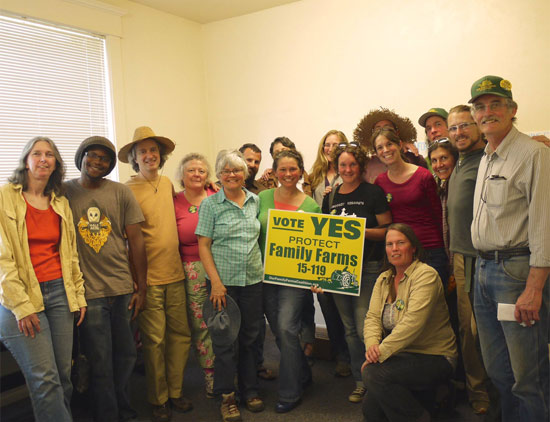GMO-free initiatives in Jackson and Josephine Counties draw national attention—and big money
By Arianne Pfoutz
Published: April 28, 2014
Category: Non-GMO Initiatives

Chris Hardy (second from right) and supporters of Jackson County’s GMO-free initiative Measure 15-119
To access all the articles in this month's issue of The Organic & Non-GMO Report, SUBSCRIBE NOW.
In Oregon, two county initiatives have taken on epic proportions as the Grocery Manufacturers Association, backed by Monsanto and other food and biotech giants, pours in more than $900,000 to defeat a measure that would ban cultivation of genetically modified crops in both counties.
That’s not surprising to Chris Hardy, an organic farmer in Ashland who spearheaded GMO Free Jackson County in 2012, after sustaining losses of his chard seed due to illegal contamination from Syngenta’s GM sugar beets. Measure 15-119, which will be voted on May 20th by mail-in ballot, would make it illegal to grow genetically engineered crops in Jackson County.
“Oregon and Washington produce 80% of US chard and beet seeds—mostly Oregon,” Hardy said. “If we don’t protect our family farms and farmers on this, the future is: Welcome to Monsanto!”
In next-door Josephine County, Karen Daggett Austin says the focus of GMO Crop Restriction Measure 17-58 (also on the May 20th ballot) is to protect the health of its community and local family farms. It would prohibit growing of GM crops and also “maintain and protect seed sovereignty and local control” of agriculture, environment, public health, and more.
“We three co-founders of GMO Free Josephine County are all moms—I’m a grandmother—and we’re worried about cross contamination with our local farms and gardens, as well as the toxic impacts the heavier pesticide use will have on our rivers, ground water and future generations,” Austin Says.
Farmers abandon risky crops
Hardy knows firsthand the price farmers are paying by sharing the valley with GMOs. He lost a contract in 2013 because of contamination concerns, and had to till his chard crop under. “Most Rogue Valley farmers have discontinued growing chard and table beets—our mainstay—because of risk,” he says.
In the narrow valleys, wind can carry GM pollen for miles. And with the deregulation of GM sugar beets in July 2012, separation distance requirements no longer exist.
Elise Higley, campaign manager for 15-119 and operator of a 113-acre organic farm in Applegate Valley, said, “Our customers do not want plants that produce their own pesticides. What they want is food with integrity.”
An onslaught of out-of-state donors
Jackson County is being vastly outspent in its campaign. Good Neighbor Farmers has raised $950,000 so far, most of it coming from outside Jackson—$455,000 of it from six pesticide and biotech firms.
GMO Free Jackson Co. formed Our Family Farms Coalition in January, and it has raised just over $100,000.
“It’s obvious the opponents are basically trying to scare people with misinformation,” Higley said. “I think it may backlash, because people are angry at out-of-state money pouring in to hurt our local businesses.”
Growing connections in Josephine: Food Integrity Project
Austin and her team at GMO-Free Josephine County are using every venue possible to get the word out. “Our farmers thank us for helping educate the community,” she says.
The Food Integrity Project is one local creative solution. “We approached our more sustainably-minded restaurants with the proposition to restructure their menus to include GMO-free items so we’d have places where we could eat and avoid GMOs. We initially invited 12, and 10 came on board without hesitation,” Austin says.
One restaurant had its highest profit margin in years, for the two months after launching the project. Nearly 50% of its menu has GMO-free offerings now, and it changed its frying oil to rice bran from GM canola.
Restaurants earn green leaves: 5 leaves is the highest rating, designating that 90% or more menu items are GMO-free. Austin and her consulting crew help the restaurant owners re-work their menus and source GMO-free options.
The project has attracted attention from counties in California, Idaho and Washington State that hope to implement the program soon.
For both Hardy and Austin, it’s relationships that fortify community. They know that the growing awareness and cohesion they’re witnessing are critical in facing the future. “After thousands of years of growing food, in just the last few, genetically engineered agriculture has taken over 75%-80% of our food supply,” Hardy said. “When you have to go to the Internet to buy seed, the life blood of your society is gone.”
© Copyright The Organic & Non-GMO Report, May 2014




